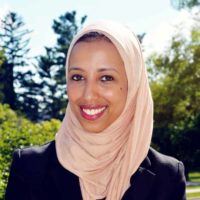
Ifrah Magan

Expert
Dr. Ifrah Magan currently serves as a faculty fellow/assistant professor at New York University (2018–2020). A qualitative researcher and social worker, Dr. Magan incorporates storytelling as a method for understanding the lived experiences of refugee and immigrant populations, particularly with regard to faith and culture. Dr. Magan takes an intersectional approach to research in vulnerable communities, focusing particularly on race, religion, gender, and class. She has extensive experience working with Somali, Rohingya, Iraqi, and Syrian refugee populations in the United States. Dr. Magan was also the Qualitative Research Lead on the MacArthur Foundation 100&Change funded partnership with Sesame Workshop and the International Rescue Committee to provide early childhood programming for refugee families in the Middle East.
Dr. Magan received a Bachelor of Science in Family and Community Services from Michigan State University, where she was a Ronald E. McNair Scholar. She then went on to receive a master’s degree from the University of Chicago’s School of Social Service Administration where she received the Kathryn Davis Peace Award and served as a Child Advocate for unaccompanied undocumented children through the Young Center at the University of Chicago School of Law. She received her doctorate from University of Illinois at Chicago, Jane Addams College of Social Work, where she received the Abraham Lincoln Fellowship and the Dr. Martin Luther King, Jr. Service Award.
Dr. Magan is fluent in English, Somali, and Arabic.
Education
BS, Michigan State University; MA, University of Chicago School of Social Service Administration; PhD, University of Illinois at Chicago Jane Addams College of Social Work
Areas of Expertise
- Refugee and immigrant populations
- Intersection of race, religion, gender, and class among vulnerable communities
- Somali, Rohingya, Iraqi, and Syrian refugee populations in the U.S.
- Early childhood programming for refugee families

